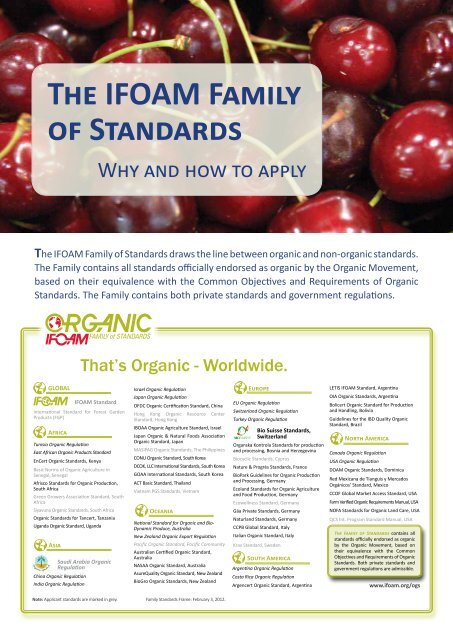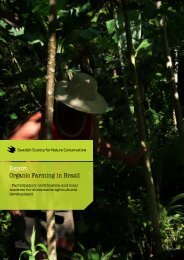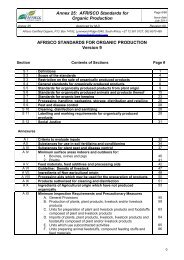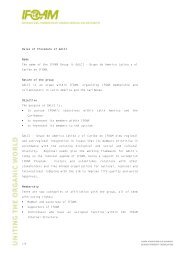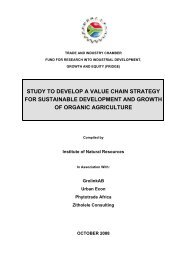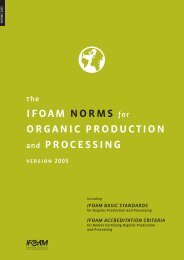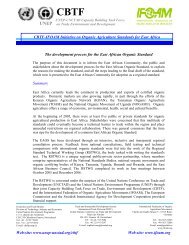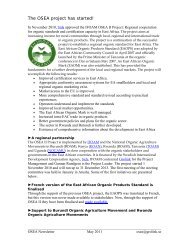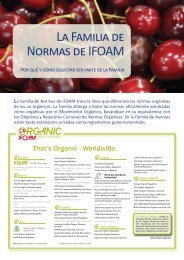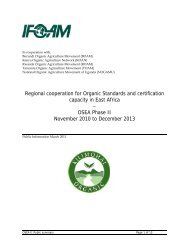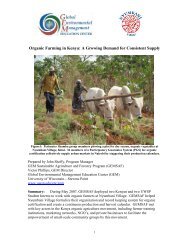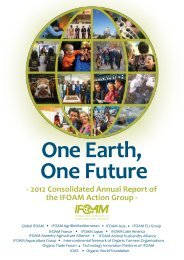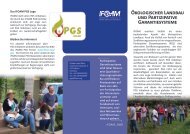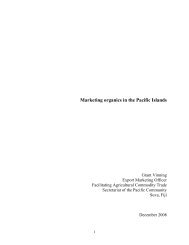The IFOAM Family of Standards
The IFOAM Family of Standards
The IFOAM Family of Standards
Create successful ePaper yourself
Turn your PDF publications into a flip-book with our unique Google optimized e-Paper software.
<strong>The</strong> <strong>IFOAM</strong> <strong>Family</strong><br />
<strong>of</strong> <strong>Standards</strong><br />
Why and how to apply<br />
<strong>The</strong> <strong>IFOAM</strong> <strong>Family</strong> <strong>of</strong> <strong>Standards</strong> draws the line between organic and non-organic standards.<br />
<strong>The</strong> <strong>Family</strong> contains all standards <strong>of</strong>ficially endorsed as organic by the Organic Movement,<br />
based on their equivalence with the Common Objectives and Requirements <strong>of</strong> Organic<br />
<strong>Standards</strong>. <strong>The</strong> <strong>Family</strong> contains both private standards and government regulations.<br />
That’s Organic - Worldwide.<br />
GLOBAL<br />
<strong>IFOAM</strong> Standard<br />
International Standard for Forest Garden<br />
Products (FGP)<br />
Africa<br />
Tunisia Organic Regulation<br />
East African Organic Products Standard<br />
EnCert Organic <strong>Standards</strong>, Kenya<br />
Basic Norms <strong>of</strong> Organic Agriculture in<br />
Senegal, Senegal<br />
Afrisco <strong>Standards</strong> for Organic Production,<br />
South Africa<br />
Green Growers Association Standard, South<br />
Africa<br />
Siyavuna Organic <strong>Standards</strong>, South Africa<br />
Organic <strong>Standards</strong> for Tancert, Tanzania<br />
Uganda Organic Standard, Uganda<br />
Asia<br />
Saudi Arabia Organic<br />
Regulation<br />
China Organic Regulation<br />
India Organic Regulation<br />
Israel Organic Regulation<br />
Japan Organic Regulation<br />
OFDC Organic Certification Standard, China<br />
Hong Kong Organic Resource Center<br />
Standard, Hong Kong<br />
IBOAA Organic Agriculture Standard, Israel<br />
Japan Organic & Natural Foods Association<br />
Organic Standard, Japan<br />
MASIPAG Organic <strong>Standards</strong>, <strong>The</strong> Philippines<br />
CONU Organic Standard, South Korea<br />
DCOK, LLC International <strong>Standards</strong>, South Korea<br />
GOAA International <strong>Standards</strong>, South Korea<br />
ACT Basic Standard, Thailand<br />
Vietnam PGS <strong>Standards</strong>, Vietnam<br />
Oceania<br />
National Standard for Organic and Bio-<br />
Dynamic Produce, Australia<br />
New Zealand Organic Export Regulation<br />
Pacific Organic Standard, Pacific Community<br />
Australian Certified Organic Standard,<br />
Australia<br />
NASAA Organic Standard, Australia<br />
AsureQuality Organic Standard, New Zealand<br />
BioGro Organic <strong>Standards</strong>, New Zealand<br />
Europe<br />
EU Organic Regulation<br />
Switzerland Organic Regulation<br />
Turkey Organic Regulation<br />
Bio Suisse <strong>Standards</strong>,<br />
Switzerland<br />
Organska Kontrola <strong>Standards</strong> for production<br />
and processing, Bosnia and Herzegovina<br />
Biocyclic <strong>Standards</strong>, Cyprus<br />
Nature & Progrès <strong>Standards</strong>, France<br />
BioPark Guidelines for Organic Production<br />
and Processing, Germany<br />
Ecoland <strong>Standards</strong> for Organic Agriculture<br />
and Food Production, Germany<br />
Ecowellness Standard, Germany<br />
Gäa Private <strong>Standards</strong>, Germany<br />
Naturland <strong>Standards</strong>, Germany<br />
CCPB Global Standard, Italy<br />
Italian Organic Standard, Italy<br />
Krav Standard, Sweden<br />
South America<br />
Argentina Organic Regulation<br />
Costa Rica Organic Regulation<br />
Argencert Organic Standard, Argentina<br />
LETIS <strong>IFOAM</strong> Standard, Argentina<br />
OIA Organic <strong>Standards</strong>, Argentina<br />
Bolicert Organic Standard for Production<br />
and Handling, Bolivia<br />
Guidelines for the IBD Quality Organic<br />
Standard, Brazil<br />
North America<br />
Canada Organic Regulation<br />
USA Organic Regulation<br />
DOAM Organic <strong>Standards</strong>, Dominica<br />
Red Mexicana de Tianguis y Mercados<br />
Orgánicos’ Standard, Mexico<br />
CCOF Global Market Access Standard, USA<br />
Farm Verified Organic Requirements Manual, USA<br />
NOFA <strong>Standards</strong> for Organic Land Care, USA<br />
QCS Int. Program Standard Manual, USA<br />
<strong>The</strong> <strong>Family</strong> <strong>of</strong> <strong>Standards</strong> contains all<br />
standards <strong>of</strong>ficially endorsed as organic<br />
by the Organic Movement, based on<br />
their equivalence with the Common<br />
Objectives and Requirements <strong>of</strong> Organic<br />
<strong>Standards</strong>. Both private standards and<br />
government regulations are admissible.<br />
www.ifoam.org/ogs<br />
Note: Applicant standards are marked in grey. <strong>Family</strong> <strong>Standards</strong> Frame: February 3, 2012.
10 reasons to apply for<br />
the <strong>IFOAM</strong> <strong>Family</strong> <strong>of</strong> <strong>Standards</strong>,<br />
including tangible benefits<br />
Upon application to the <strong>Family</strong> <strong>of</strong> <strong>Standards</strong>,<br />
you will be able to access the following benefits:<br />
1Get a<br />
thorough,<br />
independent<br />
assessment <strong>of</strong><br />
your standard.<br />
upon applying to the <strong>Family</strong>, you will have your standard assessed<br />
in detail by <strong>IFOAM</strong> experts against the COROS (Common Objectives<br />
and Requirements <strong>of</strong> Organic <strong>Standards</strong>), an international norm<br />
approved by <strong>IFOAM</strong>, FAO and UNCTAD. This assessment will<br />
enable you to see potential areas <strong>of</strong> improvement and serves as<br />
an input for possible standard revision.<br />
2Make your<br />
standard - and<br />
organization -<br />
more visible at<br />
the international<br />
level.<br />
the <strong>IFOAM</strong> <strong>Family</strong> <strong>of</strong> standards acts as THE global directory <strong>of</strong><br />
organic standards. It is prominently displayed at the <strong>IFOAM</strong> booth<br />
at all major trade fairs (e.g. BioFach), conferences and events, and<br />
on the <strong>IFOAM</strong> website. As soon as you apply to the <strong>Family</strong>, your<br />
standard will be listed (initially as an applicant) in the <strong>Family</strong> Frame.<br />
3Be part <strong>of</strong><br />
the global<br />
community <strong>of</strong><br />
organic standard<br />
setters.<br />
organic standard setting requires technical expertise as well<br />
as political sensitivity. In the <strong>IFOAM</strong> <strong>Family</strong> <strong>of</strong> <strong>Standards</strong> you are<br />
linked to <strong>IFOAM</strong> experts and the many other organic standard<br />
setters across the world, allowing you to share your expertise and<br />
benefit from that <strong>of</strong> others.<br />
4Contribute to<br />
<strong>IFOAM</strong>’s work to<br />
help harmonize<br />
and improve<br />
organic standards<br />
worldwide.<br />
the <strong>IFOAM</strong> <strong>Family</strong> <strong>of</strong> <strong>Standards</strong> is the most powerful tool through<br />
which <strong>IFOAM</strong> promotes harmonization (whenever possible) and<br />
the improvement <strong>of</strong> all organic standards globally. <strong>The</strong>re is a large<br />
potential for progress in both these areas. By joining the <strong>Family</strong> <strong>of</strong><br />
<strong>Standards</strong>, you bring your direct and indirect support for this work.
the COROS has become the most important international reference<br />
norm for evaluating organic standards. <strong>The</strong> assessment process <strong>of</strong><br />
the <strong>Family</strong> <strong>of</strong> <strong>Standards</strong> will enable you to grasp exactly how the<br />
COROS tool works in its approach and in its details. This will increase<br />
your ability to influence the future development <strong>of</strong> the COROS norm.<br />
It is also an indispensable step if you aim to use the COROS yourself<br />
in the future to assess other standards or for other purposes.<br />
5Get to know<br />
the COROS<br />
and participate<br />
in its future<br />
development.<br />
Once your standard has been approved in the<br />
<strong>Family</strong> <strong>of</strong> <strong>Standards</strong>, you will be able to access<br />
the following additional benefits:<br />
this is the core function <strong>of</strong> the <strong>Family</strong> <strong>of</strong> <strong>Standards</strong>. It contains<br />
all standards <strong>of</strong>ficially endorsed as equivalent to the COROS (and<br />
therefore as truly organic) by <strong>IFOAM</strong>. This is the international<br />
credibility criteria for organic standards. You can communicate this<br />
<strong>of</strong>ficial approval to your clients, partners, authorities, etc. through<br />
the use <strong>of</strong> a specific logo which comes with the approval.<br />
6<br />
Gain credibility<br />
through<br />
<strong>of</strong>ficial <strong>IFOAM</strong><br />
endorsement <strong>of</strong><br />
your standard.<br />
is your standard stricter than average? Is your standard especially<br />
innovative in particular areas? <strong>The</strong> assessment against the COROS<br />
will reveal these strengths and, with your consent, the conclusions<br />
<strong>of</strong> the assessment will be published through the <strong>Family</strong> Frame.<br />
This will give other stakeholders in the organic movement, as<br />
well as interested buyers, consumers and journalists, a quick and<br />
independent overview <strong>of</strong> the added value <strong>of</strong> your standard.<br />
7Efficiently<br />
communicate<br />
the strengths<br />
<strong>of</strong> your<br />
standard.<br />
the <strong>IFOAM</strong> <strong>Family</strong> <strong>of</strong> <strong>Standards</strong> is the centerpiece <strong>of</strong> the new<br />
<strong>IFOAM</strong> Organic Guarantee System (OGS). This means that to<br />
access other services <strong>of</strong> the OGS, such as accreditation or access<br />
to the Global Organic Mark for your clients, you first need to have<br />
your standard approved in the <strong>Family</strong>.<br />
8Access other<br />
OGS services<br />
that are<br />
contingent<br />
upon <strong>Family</strong><br />
approval.
9Set a basis for<br />
possible (not<br />
compulsory)<br />
entrance into bior<br />
multi-lateral<br />
equivalence<br />
agreements.<br />
as a government, or even private standard owner, you may be<br />
thinking <strong>of</strong> signing agreements with other governments or standard<br />
owners to recognize each others’ standards as equivalent. A solution<br />
which is increasingly being considered is to have approval in the <strong>Family</strong><br />
<strong>of</strong> <strong>Standards</strong> a precondition to enter into such agreements so as to<br />
guarantee a minimum acceptable level for all equivalent standards<br />
(i.e. achieving COROS equivalence).<br />
10<br />
Add value to<br />
your standard<br />
by achieving<br />
increased<br />
market access<br />
for your<br />
clients.<br />
certain countries already recognize the <strong>Family</strong> <strong>of</strong> <strong>Standards</strong> as a<br />
basis for equivalence <strong>of</strong> foreign standards. This means, once your<br />
standard is approved in the <strong>Family</strong>, it is automatically approved as<br />
equivalent by these countries and your clients can get market access<br />
using your standard. <strong>IFOAM</strong> is negotiating with further countries,<br />
and in the future this approach will become increasingly widespread.<br />
<strong>The</strong> <strong>Family</strong> <strong>of</strong> <strong>Standards</strong> promotes the concept that one standard<br />
is enough to access several markets. Reputable organic fairs are<br />
also increasingly looking at certification against a <strong>Family</strong>-approved<br />
standard as a criterion for product exhibition.<br />
Who can apply<br />
All organic standards that can be used for certification or other forms <strong>of</strong> verification are eligible to<br />
apply for the <strong>IFOAM</strong> <strong>Family</strong> <strong>of</strong> <strong>Standards</strong>, if they are final (not draft) documents that can be made<br />
public. Approval depends on the results <strong>of</strong> an equivalence assessment using the COROS.<br />
Standard owners that are currently developing or revising organic standards or regulations can also<br />
request assistance from <strong>IFOAM</strong> on how to bring their standard in line with the COROS. This is a separate<br />
service (not part <strong>of</strong> the formal <strong>IFOAM</strong> <strong>Family</strong> application process).<br />
How to apply<br />
If you are a private standard owner, download the <strong>Family</strong> <strong>of</strong><br />
<strong>Standards</strong> application form from the <strong>IFOAM</strong> website (www.ifoam.<br />
org/ogs). Submit a completed application form, along with an<br />
English, French or Spanish version <strong>of</strong> your standard, to ogs@ifoam.<br />
org. If you would like a government regulation to be considered for<br />
the <strong>IFOAM</strong> <strong>Family</strong> <strong>of</strong> <strong>Standards</strong>, please contact us directly.<br />
When to apply<br />
<strong>The</strong> <strong>Family</strong> <strong>of</strong> <strong>Standards</strong> is a service subject to fees (for private<br />
standards). <strong>The</strong> basic principle <strong>of</strong> the fee scheme (available on the<br />
<strong>IFOAM</strong> website) is: the earlier you apply, the less you will pay.<br />
Contact<br />
Joelle Katto-Andrighetto<br />
<strong>IFOAM</strong> Program Manager<br />
<strong>IFOAM</strong> Head Office<br />
Charles-de-Gaulle-Str. 5<br />
53113 Bonn<br />
Germany<br />
Tel.: +49 228 9265010<br />
Fax: +49 228 9265099<br />
ogs@ifoam.org<br />
www.ifoam.org/ogs


